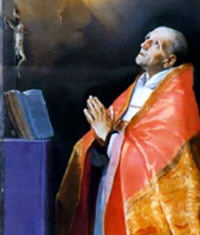“No one could restrain him.” (Mark 5:3)
If we didn’t know the reason for this man’s behavior—that he was demon possessed—it would make no sense to us. First we read that not even heavy chains and shackles could hold him down. You might even say he was free to do whatever he wanted. But what did he do with this freedom? He cried out and cut himself with stones. That’s not exactly a description of someone enjoying his freedom!
This image of the demoniac gives us some insight into the way the devil tries to attack us as well. First, he tries to convince us that we are free to do whatever we want. He urges us to throw off our restraints and do whatever we want. When we give into his temptation, we experience a brief thrill. But then the devil torments us with guilt and shame. We may search for something to dull the pain, only to feel guilty again. When we get caught in a cycle of sin like this, it can feel as if we’re in a tomb. We’re trapped and can’t escape.
Just as this man felt trapped and couldn’t break free from whatever was tormenting him, we too can feel trapped in a hopeless situation. We too can feel harassed by self-condemning thoughts and anxieties.
But we can be set free! Through the Eucharist, the bread of freedom, we can have a life-changing encounter with Christ. Just as Jesus came to this man and spoke words of freedom, he comes to us in the form of bread and wine to lift our burdens. He comes with authority and power as the Son of God, speaking to the tormenting voices and commanding them to leave us. He comes filled with his Father’s compassion, ready to loose our chains and soothe our hearts.
So the next time you are going to receive Communion, take whatever may be bothering you—all the lies, fears, anxieties, and guilt—and lay them down at the foot of the cross. Try your best to calm your mind so that you can hear Jesus’ words of peace and freedom. And offer him your praise and worship, believing that he has the power to set you free!
“Jesus, thank you for breaking all the chains that held me in bondage. Lord, I know that nothing can ever separate me from your love.”
Hebrews 11:32-40; Psalm 31:20-24
